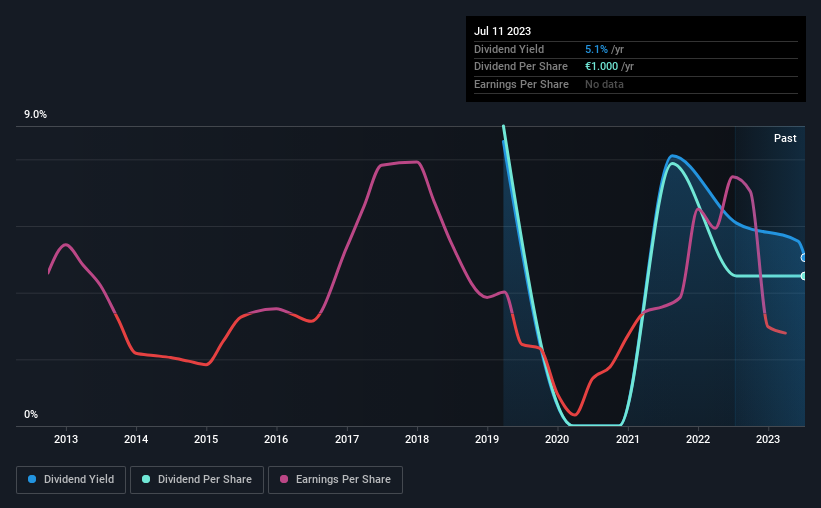Stock Analysis
- Germany
- /
- Industrials
- /
- XTRA:IUR
Read This Before Considering KAP AG (ETR:IUR) For Its Upcoming €1.50 Dividend

Readers hoping to buy KAP AG (ETR:IUR) for its dividend will need to make their move shortly, as the stock is about to trade ex-dividend. Typically, the ex-dividend date is one business day before the record date which is the date on which a company determines the shareholders eligible to receive a dividend. The ex-dividend date is an important date to be aware of as any purchase of the stock made on or after this date might mean a late settlement that doesn't show on the record date. Therefore, if you purchase KAP's shares on or after the 17th of July, you won't be eligible to receive the dividend, when it is paid on the 19th of July.
The company's next dividend payment will be €1.50 per share, which looks like a nice increase on last year, when the company distributed a total of €1.00 to shareholders. Dividends are an important source of income to many shareholders, but the health of the business is crucial to maintaining those dividends. We need to see whether the dividend is covered by earnings and if it's growing.
See our latest analysis for KAP
Dividends are typically paid out of company income, so if a company pays out more than it earned, its dividend is usually at a higher risk of being cut. KAP paid a dividend last year despite being unprofitable. This might be a one-off event, but it's not a sustainable state of affairs in the long run. Considering the lack of profitability, we also need to check if the company generated enough cash flow to cover the dividend payment. If cash earnings don't cover the dividend, the company would have to pay dividends out of cash in the bank, or by borrowing money, neither of which is long-term sustainable. Over the last year, it paid out more than three-quarters (83%) of its free cash flow generated, which is fairly high and may be starting to limit reinvestment in the business.
Click here to see how much of its profit KAP paid out over the last 12 months.

Have Earnings And Dividends Been Growing?
Companies with consistently growing earnings per share generally make the best dividend stocks, as they usually find it easier to grow dividends per share. If earnings fall far enough, the company could be forced to cut its dividend. KAP reported a loss last year, but at least the general trend suggests its income has been improving over the past five years. Even so, an unprofitable company whose business does not quickly recover is usually not a good candidate for dividend investors.
The main way most investors will assess a company's dividend prospects is by checking the historical rate of dividend growth. KAP has seen its dividend decline 16% per annum on average over the past four years, which is not great to see.
Get our latest analysis on KAP's balance sheet health here.
To Sum It Up
Is KAP an attractive dividend stock, or better left on the shelf? We're a bit uncomfortable with it paying a dividend while being loss-making. However, we note that the dividend was covered by cash flow. While it does have some good things going for it, we're a bit ambivalent and it would take more to convince us of KAP's dividend merits.
So if you want to do more digging on KAP, you'll find it worthwhile knowing the risks that this stock faces. Every company has risks, and we've spotted 2 warning signs for KAP you should know about.
Generally, we wouldn't recommend just buying the first dividend stock you see. Here's a curated list of interesting stocks that are strong dividend payers.
Valuation is complex, but we're helping make it simple.
Find out whether KAP is potentially over or undervalued by checking out our comprehensive analysis, which includes fair value estimates, risks and warnings, dividends, insider transactions and financial health.
View the Free AnalysisHave feedback on this article? Concerned about the content? Get in touch with us directly. Alternatively, email editorial-team (at) simplywallst.com.
This article by Simply Wall St is general in nature. We provide commentary based on historical data and analyst forecasts only using an unbiased methodology and our articles are not intended to be financial advice. It does not constitute a recommendation to buy or sell any stock, and does not take account of your objectives, or your financial situation. We aim to bring you long-term focused analysis driven by fundamental data. Note that our analysis may not factor in the latest price-sensitive company announcements or qualitative material. Simply Wall St has no position in any stocks mentioned.
About XTRA:IUR
KAP
KAP AG, together with its subsidiaries, provides flexible films in Germany, rest of Europe, North/South America, Asia, and internationally.
Good value with adequate balance sheet.

